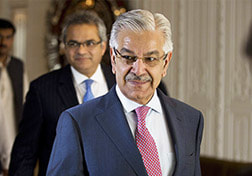
WASHINGTON - Pakistan has warned India against striking at its nuclear installations and said Islamabad won't hold back if this happened, Pakistani media reported on Friday. Foreign Minister Khawaja Mohammad Asif's remarks was in response to Indian Air Force chief B.S. Dhanoa's statement on Wednesday that if India needed to carry out a surgical strike, his aircraft could target Pakistan's nuclear installations and destroy them.

The minister told a discussion at the US Institute of Peace here that Indian leaders should not even contemplate such action as it could have "dire consequences", the Dawn reported on Friday.
"The Indian air chief said 'we will hit', through another surgical strike, Pakistan's nuclear installations. If that happens, nobody should expect restraint from us. That's the most diplomatic language I can use," Asif said.
The minister, who is in Washington on a three-day official visit, met US National Security Adviser Gen H.R. McMaster on Thursday, a day after holding wide-ranging talks with Secretary of State Rex Tillerson.
While both Islamabad and Washinton described the Asif-Tillerson talks as "positive" and "useful", Asif indicated his meeting with McMaster was not as friendly as the earlier one. "I will not be extravagant. Yesterday's meeting went very well, today's meeting with Gen McMaster in the morning, I would be a bit cautious about it. But it was good. It was good. It wasn't bad," he said. Later, speaking about the new US policy on Afghanistan, Asif told journalists at the Pakistan embassy here that Islamabad was "genuinely concerned" about New Delhi's role in the plan.
Asif said the Pakistan-US bilateral relationship had taken a new turn after the announcement of Washington's South Asia strategy.
"If on one hand the US has its concerns about the future of Afghanistan, Pakistan seeks recognition of its legitimate security concerns in the region," the Dawn quoted him as saying. "We are genuinely concerned with respect to the role accorded in the strategy to India in general and its efforts, geared towards destabilisation in Balochistan, in particular. "Pakistan believes that unless there is stability in Afghanistan, the dividends of peace in the region would continue to elude us," he said. To achieve that goal both the US and Pakistan need to work closely, he added. "On our part, we have completely wiped out all the hideouts used by terrorists and anti-state elements. However, this is an ongoing process with continuing intelligence-based operations by law enforcement agencies across the country." He said Pakistan was extremely concerned about the "safe havens" of terrorists which he alleged were mostly operating from ungoverned spaces in Afghanistan, which he claimed covered more than 40 per cent of the area of the country. Asif said a number of terror attacks in Pakistan in recent months had been traced back to elements operating from bases in Afghanistan. Relations between India and Pakistan have slided sharply in recent times amid unending Army-versus-Army battles on the Jammu and Kashmir frontier. Islamabad also accuses Kabul of acting in concert with New Delhi to damage Pakistan's interests.
"The Indian air chief said 'we will hit', through another surgical strike, Pakistan's nuclear installations. If that happens, nobody should expect restraint from us. That's the most diplomatic language I can use," Asif said.
The minister, who is in Washington on a three-day official visit, met US National Security Adviser Gen H.R. McMaster on Thursday, a day after holding wide-ranging talks with Secretary of State Rex Tillerson.
While both Islamabad and Washinton described the Asif-Tillerson talks as "positive" and "useful", Asif indicated his meeting with McMaster was not as friendly as the earlier one. "I will not be extravagant. Yesterday's meeting went very well, today's meeting with Gen McMaster in the morning, I would be a bit cautious about it. But it was good. It was good. It wasn't bad," he said. Later, speaking about the new US policy on Afghanistan, Asif told journalists at the Pakistan embassy here that Islamabad was "genuinely concerned" about New Delhi's role in the plan.
Asif said the Pakistan-US bilateral relationship had taken a new turn after the announcement of Washington's South Asia strategy.
"If on one hand the US has its concerns about the future of Afghanistan, Pakistan seeks recognition of its legitimate security concerns in the region," the Dawn quoted him as saying. "We are genuinely concerned with respect to the role accorded in the strategy to India in general and its efforts, geared towards destabilisation in Balochistan, in particular. "Pakistan believes that unless there is stability in Afghanistan, the dividends of peace in the region would continue to elude us," he said. To achieve that goal both the US and Pakistan need to work closely, he added. "On our part, we have completely wiped out all the hideouts used by terrorists and anti-state elements. However, this is an ongoing process with continuing intelligence-based operations by law enforcement agencies across the country." He said Pakistan was extremely concerned about the "safe havens" of terrorists which he alleged were mostly operating from ungoverned spaces in Afghanistan, which he claimed covered more than 40 per cent of the area of the country. Asif said a number of terror attacks in Pakistan in recent months had been traced back to elements operating from bases in Afghanistan. Relations between India and Pakistan have slided sharply in recent times amid unending Army-versus-Army battles on the Jammu and Kashmir frontier. Islamabad also accuses Kabul of acting in concert with New Delhi to damage Pakistan's interests.